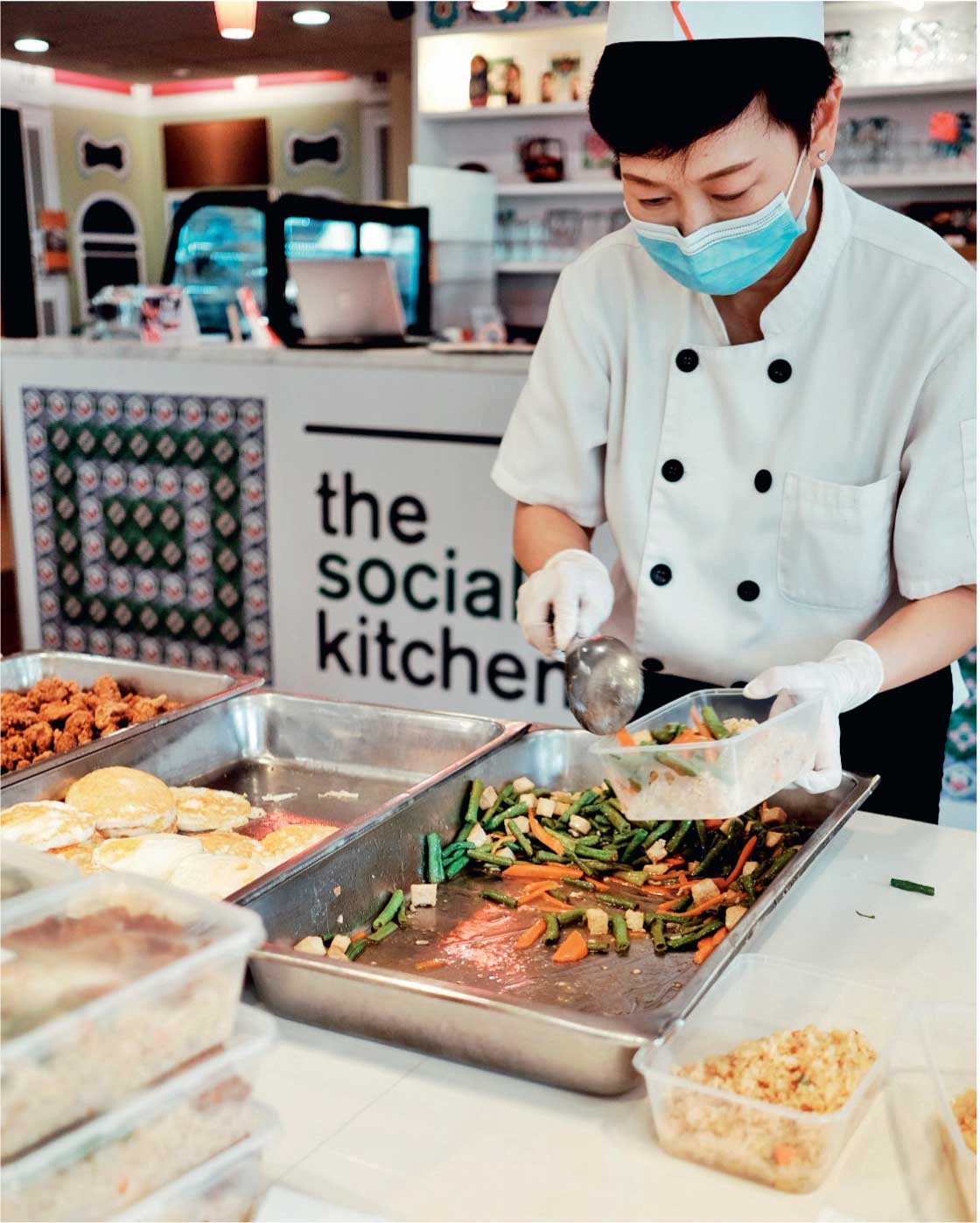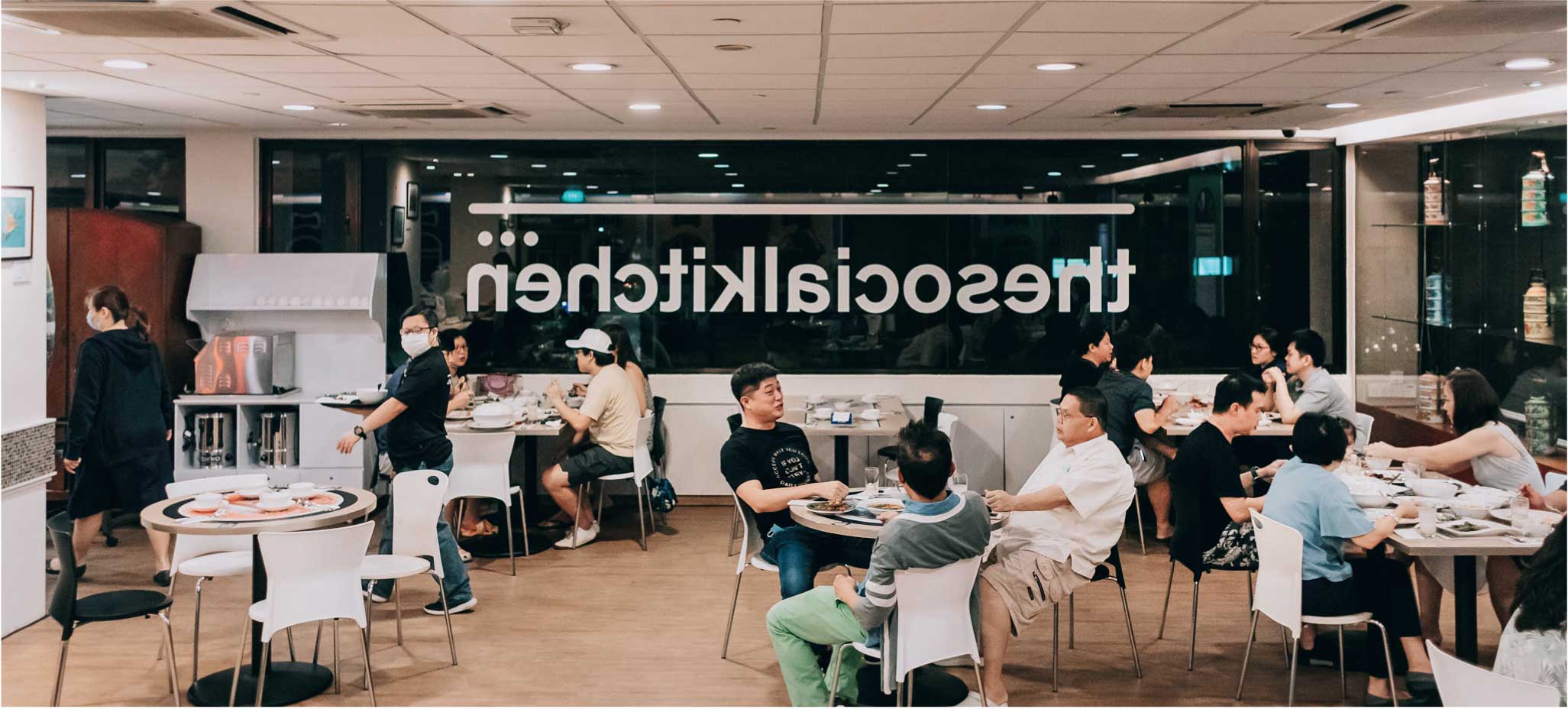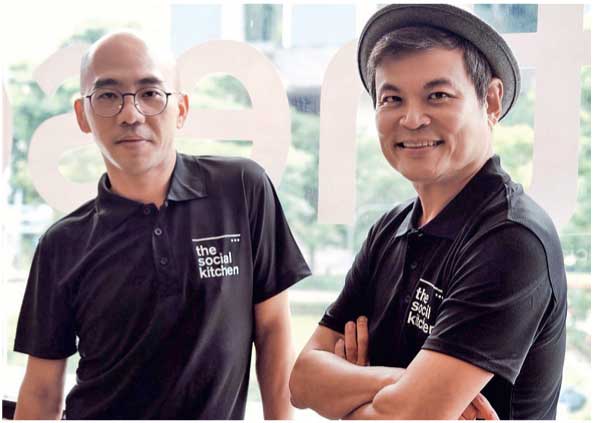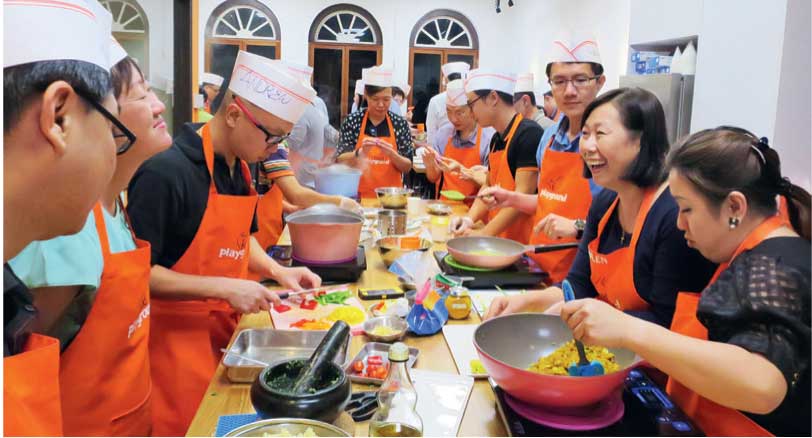Stories > Gastronomy for Good
Gastronomy for Good
A new central kitchen helps food and beverage businesses affected by the pandemic, as well as provide employment opportunities for vulnerable groups.
BY ALYWIN CHEW
bout 30 years ago, when he was serving in the navy, Alvin Yapp would offer the breakfast that his mother had lovingly made for him to a homeless man he walked past every morning while on the way to Sembawang Naval Base, located in the northern part of Singapore.
Today, the 50-year-old has continued to use food as a means to do good, albeit in a different manner.
In August 2020, Yapp and his friend, Ang Kian Peng, set up The Social Kitchen, a centralised kitchen that works with and contributes to the community in two ways.
The first beneficiary of The Social Kitchen are local food enterprises that have been battered by Covid-19. Because the central kitchen provides the infrastructure and manpower, local food and beverage businesses – many struggling to stay afloat amid the pandemic – get to save on costs associated with these matters.
The catch? These enterprises need to provide the centralised kitchen with the required ingredients. The Social Kitchen then completes the last mile by putting together these dishes.
The other beneficiary are people from vulnerable groups, such as those from lowincome families or those with disabilities, that the kitchen exclusively hires and trains.

In light of the ongoing Covid-19 pandemic, food and beverage establishments have had to pivot to new business models. The Social Kitchen, which operates on a cloud kitchen concept, helps the community by employing people from low-income groups and those with disabilities.
A CONDUIT FOR GOOD
The Social Kitchen can be considered somewhat of an enigma. The kitchen that it operates out of does not even belong to the outfit but to a charity organisation. Its flagship outlet, for example, operates out of the kitchen of Y Cafe YMCA in downtown Singapore.
The initiative also benefits the charity to an extent, as it allows, in this case, the YMCA to focus on its community outreach efforts and not worry about the running of its kitchen, says Yapp.
“We aren’t even a restaurant brand. We are just a conduit that brings the best of different industry players together in a sustainable manner,” he adds, before explaining that such a model improves sustainability as it compels food businesses to streamline their processes and identify what can be prepared beforehand.
Yapp says the initial plan was to open a cloud kitchen with no dine-in facilities, but the duo later decided to make the most of the café space at the YMCA. Besides the offerings of the nine brand partners, customers can also order from a selection of in-house dishes that have been added to diversify the menu.

The central kitchen model has proved to be a win-win formula for both F&B businesses as well as customers, who get more variety under one roof.
“EVERYONE WANTS TO BE HAPPY IN LIFE, AND WHAT BETTER WAY TO BE HAPPY THAN TO MAKE A DIFFERENCE IN THE LIVES OF OTHERS. HELPING OTHERS IS PART OF WHO WE ARE. IT JUST MAKES LIFE THAT MUCH MORE WORTH LIVING.”

Ang Kian Peng (left) and Alvin Yapp started the cloud kitchen concept at the Y Cafe at YMCA Singapore (top). It now offers food from nine partner restaurants.
Given Ang’s experience in managing such a project – he is the founder of Samsui Kitchen, a social enterprise within the Changi Prison Complex that engages inmates to prepare healthy meals for the elderly and needy – the main challenge faced in getting The Social Kitchen up and running had little to do with operational matters. Rather, it was all about convincing the business partners.
“The brands were naturally suspicious about our intentions. They thought we might steal their recipes!” quips Yapp.
“As for the charities we approached, they too were sceptical about this business model. They feared we were going to be too commercial. They wondered what they could stand to gain from such a partnership.”
To convince these two parties, Yapp invited them to the Intan Museum, which besides being a charming repository of Peranakan antiques is also a platform that he uses to raise funds for charitable causes.
There, the stakeholders learnt about the various charitable endeavours made under the banner of Project Intan, which won both Yapp and Ang the President’s Volunteerism & Philanthropy Award in 2016.
“When they came and saw the work I do at the Intan Museum, they knew that we could be trusted,” he says.
Besides preparing food for their business partners, The Social Kitchen also whips up meals for the “1,000 for 100” initiative that Yapp and Ang rolled out in September.
The initiative involves encouraging individuals and companies to contribute $1,000 for 100 meals to support a charity of their choice.
A MUCH-WELCOMED INITIATIVE
The Social Kitchen’s stakeholders did not have to wait long to enjoy the benefits of the partnership.
Long Black Café says the additional revenue stream provided by the central kitchen has proved vital in helping it survive during the pandemic.
“Most of our customers are from the offices in and around our café at One North. Because most people were still working from home during Phase 2 of the circuit breaker, our revenue dropped by about 70 percent compared to normal times,” says Tan Kian Heng, the director of the café.
“Being part of The Social Kitchen has provided us with additional income that has been crucial in helping us stay afloat. Furthermore, because of its nature as a cloud kitchen, our business can be more sustainable because we don’t have to spend on kitchen equipment, which can be very expensive, to expand our presence.”
Tan says that there are also plans to teach The Social Kitchen’s staff how to brew a good cup of coffee.

“Being part of The Social Kitchen has provided us with additional income that has been crucial in helping us stay afloat.” Tay Kian Heng, director, Long Black Cafe
Before his encounter with The Social Kitchen, he says he found it difficult to find a job that had a balance between not being too strenuous and having understanding colleagues. Here, many of his colleagues are people with special needs or their caregivers, and this has inherently created a conducive and comfortable environment for learning.
“I used to be flustered at the thought of handling money, but The Social Kitchen has provided me with a safe platform to learn. In fact, I am even training to be a barista now,” he says.
Though his new project has just gotten underway, Yapp is already looking beyond the horizon. The plan for the future, he says, is to open a whopping 50 cloud kitchens across Singapore.
“Everyone wants to be happy in life, and what better way to be happy than to make a difference in the lives of others,” he explains.
“Helping others is part of who we are. It just makes life that much more worth living.”
|
KITCHENS FOR GOODThree social initiatives that are putting food on the table in a meaningful way. FOOD PLAYGROUND Founded by Daniel Tan in 2012, Food Playground (top) operates a kitchen at a Chinatown heritage shophouse in Singapore, training stay-at-home mothers and senior citizens – individuals who face barriers to gaining meaningful employment – to become instructors and event facilitators at cooking classes and corporate team-building workshops, where participants learn how to cook local dishes such as nasi lemak, laksa and chicken rice. It received the Singapore Service Excellence Medallion in 2015. SAMSUI SUPPLIES & SERVICES While one of its two central kitchens operates out of a prison and provides food prepared by inmates – helping them to gain culinary training and job opportunities within the company upon their release – to beneficiaries such as Peacehaven Nursing Home and TOUCH Community Services, the other kitchen at the Enabling Village provides culinary training and employment opportunities to individuals with disabilities. DIGNITY KITCHEN Dubbed Singapore’s first social enterprise food court, it is home to seven hawker stalls, each of which is run by people who are disadvantaged or disabled. The initiative is part of Project Dignity, an organisation founded by Koh Seng Choon in 2010 that provides training to such individuals before helping them find jobs in the hospitality and retail industries. It received the President’s Challenge Social Enterprise Award in 2015. |

